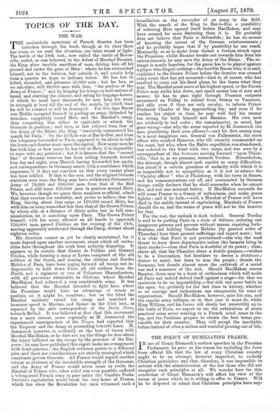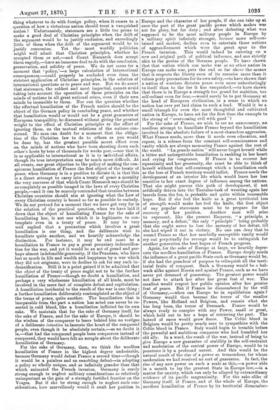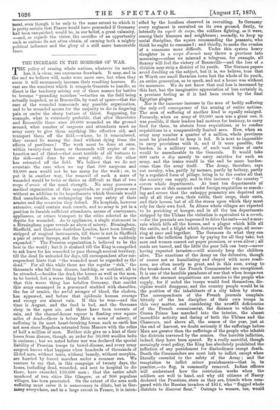THE POLICY OF HUMILIATING FRANCE.
IN one of Count Bismarck's earliest speeches in the Prussian 1 Parliament, he gave as his reason for excluding the Jews from official life that the law of every Christian country ought to be an attempt, however imperfect, to embody Christian principles; and that, therefore, it was impossible to entrust with the administration of the law those who did not recognize such principles at all. We wonder how far this conviction of Count Bismarck's will affect his view of the terms of peace which he is willing to offer to France. Will he be disposed to admit that Christian principles have any- thing whatever to do with foreign policy, when it comes to a ;question of how a victorious nation should treat a vanquished nation Unfortunately, statesmen are a little too prone to _make a good deal of Christian principles when the drift of the argument would be to justify exclusion, and exceedingly little of them when the drift of the argument would be to
justify concession. Yet the - most worldly politician might well admit that Christian principles, whether he -accepted them or not, —and Count Bismarck does accept them eagerly,—have an immense deal to do with the conclusion, preservation, and solidity of peace. We do not mean for a moment that ' policy,'—a large calculation of international consequences,—could properly be excluded even from the strictest application of Christian principles, in the solution of international questions as to peace and war. But we do assert -that statesmen, the coldest and most impartial, cannot avoid taking into account the operation of these principles on the minds of nations in all great national crises, even if their own minds be insensible to them. Nor can the question whether the effectual humiliation of the French nation should be the object of the German policy in concluding peace, and whether that humiliation would or would not be a great guarantee of European tranquillity, he discussed without giving the greatest -weight to the effect of Christian principles or the effect of ignoring them, on the mutual relations of the nations con- cerned. No man can doubt for a moment that the obliga- tion of the Christian law to do to others as you would be done by, has the greatest possible secret effect even on the minds of nations who have been shooting down each _other's hosts by tens of thousands for weeks past,—nor that it is as applicable to international as it is to individual affairs, though its true interpretation may be much more difficult. At all events, one great objection to the policy of making the con- spicuous humiliation of France the first object of the treaty of peace, when Germany is in a position to dictate it, is that this is a direct attempt to carry into a treaty of peace a morality the very converse of that which Count Bismarck says should be as completely as possible imaged in the laws of every Christian people,—and it can be scarcely contended that treaties between Christian countries should aim at ignoring what the Law of .every Christian country is bound as far as possible to embody. We do not pretend for a moment that we have got very far in the solution of the practical question, when we have laid it clown that the object of humiliating France for the sake of -humiliating her, is not one which it is legitimate to con- template even in a treaty of peace. It may be very well replied that a precaution which involves a great humiliation is one thing, and the deliberate wish to humiliate quite another, and we heartily acknowledge the -distinction. For instance, it may be and must be a humiliation to France to pay a great pecuniary indemnifica- tion for the war, and yet it would be an act of grand and per- haps almost indefensible generosity, if the Prussians, who have lost so much in life and wealth and happiness by a war which they did not originate, were to decline to ask for any such in- demnification. Still it is a point gained if it be admitted that the object of the treaty of peace ought not to be the further humiliation of France—though no doubt a humiliation, and perhaps a very wholesome humiliation of all kinds, must be involved in the mere fact of complete defeat and capitulation. A humiliation incidental to the result of the war is one thing ; a further humiliation deliberately contemplated as the object of the terms of peace, quite another. The humiliation that is inseparable from the part a nation has acted can never be re- sented in cold blood, like a humiliation inflicted for its own -sake. We maintain that for the sake of Germany itself, for the sake of France, and for the sake of Europe, it should be .the wisdom of the conqueror to leave behind him no vestiges of a deliberate intention to lacerate the heart of the conquered people, even though it be absolutely certain,—as no doubt it is,—that had the conquered people been conquerors instead of conquered, they would have felt no scruple about the deliberate humiliation of Germany.
For the sake of Germany, then, we think the needless humiliation of France in the highest degree undesirable, because Germany would defeat France a second time—though it would be a painless and an ennobling defeat—in adopting a policy so wholly unique, and so infinitely grander than that which animated the French invasion. Germany is surely strong enough to neglect military considerations so relatively unimportant as the gain of a strongly fortified frontier on the -Vosges. But if she be strong enough to neglect such con- siderations, how marvellously would it exalt her position in
Europe and the character of her people, if she can take up at once the part of the great pacific power which makes war not for glory, but for duty ; and after defeating what was
supposed to be the most military people in Europe by a military spirit infinitely stronger, because more self-con-
tained and modest, decline even to entertain those notions of aggrandizement which were the great spur to the French invasion. This would indeed be entering on a new and original path of political influence, and one strictly akin to the genius of the German people. To have shown that that nation which can make war as no other nation in Europe can make war, puts the end so far above the means that it respects the liberty even of its enemies more than it values petty precautions for its own safety,—to have shown that a nation of warriors dictates peace even more unhesitatingly to itself than to the foe it has vanquished,—to have shown that there is in Europe a strength too grand for ambition, too self-reliant even for fear,—would surely be to put Germany at the head of European civilization, in a sense in which no nation has ever yet laid claim to such a lead. Would it be a small triumph for even the most thoughtful and cultivated nation in Europe, to have set for the first time the example to the strong of "overcoming evil with good "?
For the sake of France, we wish to see no unnecessary, no needless attempt to humiliate France beyond the humiliation involved in the absolute failure of a most shameless aggression.
What France needs, more than it needs even education, and repose, is a release from the constant self-consciousness and vanity which are always measuring France against the rest of the world. "La grande nation " will never forget herself while a bitter and unforgettable humiliation is rankling in her heart and crying for vengeance. If France is to recover her equanimity and her generosity, she must be able to think of herself without that self-contempt which a humiliation such as the loss of French territory would inflict. France needs the development of an interior life which would leave her less sensitive to her exact degree of influence among the nations.
That she might pursue this path of development, if not artifically driven into the Tantalus-task of wresting again her laurels from the foe, is probable and quite within reasonable hope. But if she feel the knife as a great territorial loss of strength would make her feel the knife, the first object of any popular statesman must be to prepare for the recovery of her position. Another man will arise to represent, like the present Emperor, "a principle, a memory, and a defeat," the only " principle " being probably that she ought never to lose the memory of her defeat, till she had wiped it out in victory. No one can deny that to wound France so that her morbidly susceptible vanity would cry out perpatually for revenge would be to extinguish for another generation the beat hopes of French progress.
Again, for the sake of Europe at large, we heartily depre- cate the needless humiliation of France. Europe deeply needs the influence of a great pacific State such as Germany would be, if she had the grandeur of purpose to relinquish all the terri- torial fruits of conquest. Such a Germany would be a bul- wark alike against Russia and against France, such as we have never yet dreamed of possessing. The greatest power would not dare to attack her after her great feat of war. The smallest would respect her public opinion after her greater feat of peace. But if France be dismembered by the will of Germany,—when can Europe be in equilibrium again?
Germany would then become the terror of the smaller Powers, like Holland and Belgium, and remain what she has long been, the terror of Denmark. France would be always ready to conspire with any Power, small or great, which held out to her a hope of retrieving the past. The hatred of races would grow fierce. The Celtic blood in Belgium would be pretty nearly sure to sympathize with the Celtic blood in France. Italy would begin to tremble before the powerful and ambitious conqueror who had humbled her old ally. In a word, the result of the war, instead of being to give Europe a new guarantee of stability in the self-restraint and moderation of the central power of Europe, would be to penetrate it by a profound unrest. And this would be the natural result of the rise of a power so tremendous, for whose moderation we had received no sort of guarantee. In fact, the rise of any new power on such a scale as this,—a power able in a month to lay the greatest State in Europe low,—is a matter for anxiety, which can only be allayed by extraordinary evidence of its pacific magnanimity. For the sake alike of Germany itself, of France, and of the whole of Europe, the needless humiliation of France by its territorial dismember-
=ant, even though it be only to the same extent to which it is pretty certain that France would have proceeded if Germany had been vanquished, would be, in our belief, a great calamity, —and, as regards the victor, the sacrifice of an opportunity such as nations do not often obtain, of earning both a mighty political influence and the glory of a still more honourable fame.
































 Previous page
Previous page